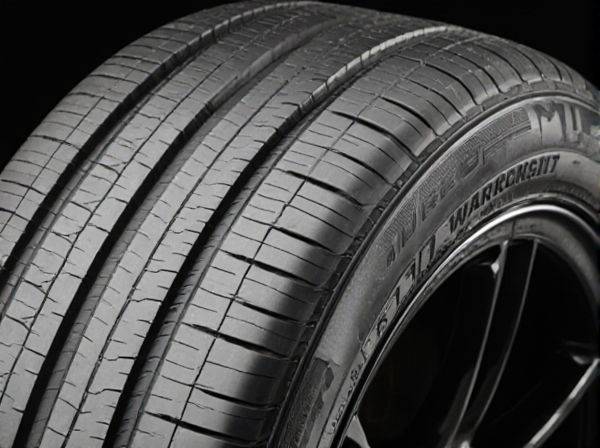
Photo illustration: Sport Tire vs Comfort Tire
Sport tires deliver enhanced grip, sharper handling, and better performance for aggressive driving and high-speed cornering, making them ideal for enthusiasts seeking maximum control. Comfort tires prioritize a smooth, quiet ride with superior cushioning to absorb road imperfections, focusing on reducing road noise and improving overall ride comfort. Selecting the right tire depends on your driving style and priorities, balancing performance with comfort to suit your specific needs.
Table of Comparison
| Feature | Sport Tire | Comfort Tire |
|---|---|---|
| Purpose | High performance, handling, and grip | Smooth ride, noise reduction, and durability |
| Tread Design | Aggressive pattern for maximum traction | Optimized for quiet and comfortable driving |
| Rubber Compound | Softer for better grip, wears faster | Harder for longer life and comfort |
| Performance in Weather | Best on dry and wet roads, limited snow | Good all-around, better in wet and snow |
| Ride Quality | Firm and responsive | Smoother and quieter |
| Typical Use | Sports cars, performance vehicles | Sedans, family cars, daily commute |
| Price Range | Higher cost due to specialized design | Moderate, budget-friendly options available |
Introduction to Sport Tires and Comfort Tires
Sport tires provide enhanced grip, responsiveness, and handling, optimized for high-speed performance and aggressive driving on dry and wet surfaces. Comfort tires prioritize ride smoothness, noise reduction, and durability, designed to offer a quieter, softer driving experience over varied road conditions. Key features of sport tires include stiffer sidewalls and specialized tread patterns, while comfort tires emphasize flexible construction and tread compounds that absorb road imperfections.
Defining Sport Tires: Features and Benefits
Sport tires feature a specialized tread design, softer rubber compounds, and reinforced sidewalls to enhance grip, cornering, and braking performance on both dry and wet surfaces. Their high-performance construction improves steering response and stability at high speeds, making them ideal for aggressive driving and sporty vehicles. These tires provide superior traction and handling benefits, though they may wear faster and offer a firmer ride compared to comfort tires.
Understanding Comfort Tires: Features and Benefits
Comfort tires feature softer sidewalls and specialized tread patterns designed to absorb road vibrations and reduce noise levels, providing a smoother, quieter ride. Their compound materials prioritize flexibility and cushioning, enhancing overall driving comfort on both city streets and highways. These tires improve handling stability while minimizing fatigue during long drives, making them ideal for daily commuting and long-distance travel.
Performance Differences: Grip, Speed, and Handling
Sport tires deliver superior grip and handling by utilizing softer rubber compounds and enhanced tread designs, optimizing traction for high-speed cornering and quick acceleration. Comfort tires prioritize ride smoothness and reduced road noise, featuring stiffer sidewalls and harder compounds, which results in less responsive handling but improved durability and comfort. The performance trade-off highlights sport tires as ideal for aggressive driving, while comfort tires are better suited for everyday commuting with a focus on ride quality.
Ride Comfort and Noise Levels Compared
Sport tires prioritize grip and handling performance, often resulting in a firmer ride and increased road noise due to their stiffer sidewalls and aggressive tread patterns. Comfort tires are engineered with softer compounds and optimized tread designs to absorb road imperfections, significantly reducing vibration and delivering a quieter cabin experience. Evaluations show that comfort tires can reduce interior noise levels by up to 15 decibels compared to sport tires, enhancing overall ride smoothness for daily driving.
Tire Longevity and Durability
Sport tires generally have a shorter lifespan due to their softer rubber compounds designed for enhanced grip and performance, resulting in faster wear. Comfort tires are engineered with harder compounds and reinforced sidewalls, providing greater durability and longer tread life ideal for everyday driving. Selecting tires depends on prioritizing performance versus longevity, with comfort tires offering better value for extended use.
Fuel Efficiency: How Each Tire Affects Your Drive
Sport tires generally feature softer rubber compounds and aggressive tread patterns that increase rolling resistance, resulting in lower fuel efficiency compared to comfort tires. Comfort tires prioritize fuel-saving designs with harder compounds and optimized tread patterns that reduce rolling resistance, enhancing miles per gallon. Choosing comfort tires can improve overall fuel economy by up to 5-10% in typical driving conditions.
Weather and Road Conditions Suitability
Sport tires excel in dry and warm weather conditions due to their optimized tread patterns and rubber compounds that enhance grip and handling on smooth, paved roads. Comfort tires are better suited for diverse weather conditions, including wet and cold environments, with tread designs that improve water dispersion and provide a smoother ride on rough or uneven surfaces. Selecting the appropriate tire depends on prioritizing performance in dry conditions versus all-weather reliability and ride comfort.
Cost Comparison and Value for Money
Sport tires typically have a higher upfront cost due to advanced rubber compounds and performance-oriented tread designs, but their shorter lifespan can increase long-term expenses. Comfort tires offer more affordable prices with longer tread life, providing better value for daily driving and extended use. When evaluating cost versus performance, comfort tires deliver greater overall value for money by balancing price, durability, and ride quality.
Choosing the Right Tire for Your Driving Needs
Sport tires offer enhanced grip and responsiveness, ideal for aggressive driving and high-speed cornering, while comfort tires prioritize ride smoothness and noise reduction for everyday commuting. Selecting the right tire depends on your typical driving conditions, with sport tires suited for performance enthusiasts and comfort tires better for long-distance travel or urban environments. Evaluating factors like road types, driving style, and weather conditions ensures optimal safety, efficiency, and satisfaction.
 caratoz.com
caratoz.com